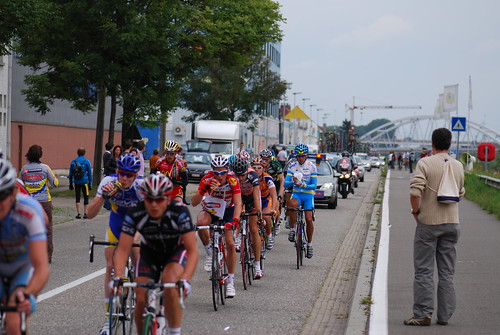 |
| photo by Frederik De Buck |
The dry, dusty conditions and sunny skies can easily make you think that Paris-Roubaix is an easy race, but then you notice the choking clouds of dust, the hurtling of flesh and metal to the ground without rhyme or reason and you see that L'Enfer du Nord has a vast array of ways to take a toll on those who attempt it.
Van Summeren was the unlikely hero of the day, not because he is incapable of greatness, but simply that that is not his lot in cycling life. He is a worker; a domestique. Granted, he is an exceptionally good one, but imagine being paid not to win, but to cut through the wind and slog so that others may find their way to glory and accolades. Van Summeren was the dutiful worker, out in the early break of 2nd tier hopefuls and other riders acting as rabbits to the pack of hounds cooling their heels in the peloton until the awful moment when they get down to the business of winning a bike race and sweep the early break away with seemingly little effort.
It was the worker in Van Summeren that set off alone out of that break in the close of the race. A human hedged bet played by the Directeur Sportif. "Go it alone" would have been the call and Van Summeren wold have set off not really to win, but to provide a last line of defense for his team captain following the call to glory. Van Summeren would have done that last bit of work for Thor Hushovd had Fabian Cancellara followed his usual script and towed Hushovd and Allesandro Ballan towards the velodrome in Roubaix.
But Cancellara's failure of imagination, his notion that with 50k to go he would simply dig deep, unleash a powerful surge and ride men off of his wheels on his way to another Paris-Roubaix win was not to be. As happened in the Tour of Flanders, the other strong men have grown wise to this strategy and nullified it. Cancellara's decision to back off and insist on the other men's help in reaching the velodrome had consequences for all at the head of affairs yesterday. For Van Summeren, it was the most awful consequence of all, the weight of possible glory now piled on to his lanky, tired frame.
You can see a lifetime of suffering in the slump and roll of a riders shoulders as they squeeze every single watt from their fragile body and Van Summeren's lanky frame was no exception. Moments of self doubt were writ large upon him, but some internal voice willed him back to effort and the beautiful hand that Fate had played him.
Van Summeren rode in the wheel tracks of other domestique breakaways. Thomas Wegmuller and Dirk De Mol in 1988 came through the streets of Roubaix on a similar day as yesterday. A plastic bag lodged in the rear derailleur of Wegmuller's bike, rendering shifting impossible and making him easy prey for De Mol in the sprint. Or the less successful Patrick Versluys who raced Paris-Roubaix 8 times in his career, never finishing less than 15th and who, in 1987, came to the race with the single-minded purpose of winning. Versluys was the unlikeliest of potential winners, but he seized the moment in an early breakaway in awful wet, snowy conditions and rode with fire as those around and behind him faltered and crashed. The mighty Sean Kelly rode as blood flowed down the side of his head and mixed with the mud that covered the right side of his body. Like so many before him, Roubaix proved to be about 800 meters too far from Versluys. Eric Vanderaerden, the dutch star from Panasonic, roared up to the beleaguered group of unlikely stars and announced, "I'm here!" before unleashing his trademark sprint and dashing Versluys to the second step of the podium.
Surely Van Summeren was too lost in a shroud of effort to think of these things. Then the powerful, aquiline form of Fabian Cancellara bent to the bars and cranks and began the inexorable drag race to the velodrome in Roubaix. Second after second was taken back. Van Summeren felt the blue cobbles of Pave Secteur 1 under his wheels and looked back nervously wondering if he would see the stalking form of death metronomically grinding away with awful power the last few meters that separated him from "the catch". But Van Summeren saw nothing but empty road behind him as he swung the right turn onto the concrete velodrome. He hit the blue apron, mashed the last bit of effort out of his spent body and crossed the line. I imagine the first thing he felt was not a sense of wonder or glory, but of relief.
Chapeau, Johan.
2 comments:
thanks, Shawn nice post of reflections on a marvelous Paris-Roubaix. It seems the second tier is so strong that the old tactics of the media anointed Demi-gods is no longer sufficient to gaurantee a win, especially in the crap-shoot of the spring classics.
Great post Shawn! A very good read indeed.
Jack
Post a Comment